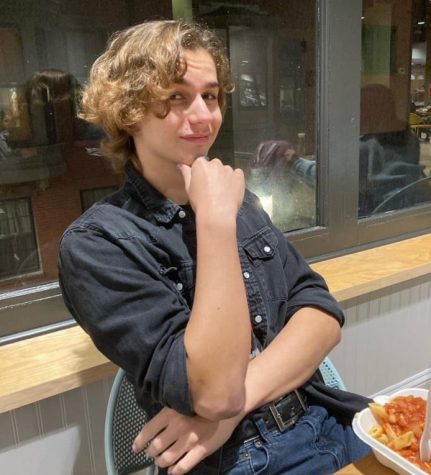Many students anticipate their first year of college as a milestone—their initial steps onto campus marking a momentous transition between adolescence into adulthood.
Emerson’s class of 2024, however, is weathering a year they’ve described as anything but traditional.
At the beginning of the fall 2020 semester, incoming first-year students experienced a campus markedly different from those before them. The world of hybrid learning, mask mandates, and social-distancing policies marked a far cry from what many students imagined college would look like.
“This year, coming here during the pandemic, the transition was so weird,” journalism major Morgan Gaffney said. “It was nothing like what I expected—and I think I definitely miss [what I expected].”
For first years, the college experience was different as soon as they arrived on campus. Instead of the memorable orientation process—sitting in the Cutler Majestic Theatre, shaking Lee Pelton’s hand, and watching orientation leader dances—they sat through their move-in quarantine period on Zoom.
“There was no proper orientation or way to meet people,” Jake Tannenbaum, a visual and media arts major, said. “It’s a very odd situation just because we missed that. The whole point of orientation, in general, is that it sucks, and then you find people who hate it as much as you do and you become lifelong friends.”
Tannenbaum and others said the pandemic’s most apparent effects came in their social life. The in-person organization fair, where most students can interact with members of different clubs, was moved online. Many in-person extracurricular activities were suspended, fraternity and sorority life paused recruitment, and classes were forced online or into the hybrid model—shutting off various outlets for those freshmen that came to college alone.
“Two of my siblings have already gone to college, and right off the bat, they were meeting people and going places—they could do so much,” Gaffney said. “For us, that’s not really an option. You do meet people, and you do make friends, but it’s so much more hindered.”
Gaffney, like most of her peers, was denied much of her senior year of high school, as the pandemic forced the cancelation of various long-awaited events like senior prom and in-person graduation ceremonies.
“There were a lot of things I was looking forward to,” Megan Riley, who has not declared a major, said. “They are never going to happen because of the pandemic.”
Luke Colombero, a theatre and performance major, said he hoped—in vain—that his first year of college would have been different from the experience during his abridged senior year.
“With COVID, the same thing is happening in college,” he said. “You can’t hang out with anyone, can’t have [the] get-togethers we all wanted to have with our close friends. It’s just devastating.”

The pandemic prevented many freshmen from touring the college before they arrived in the fall. Colombero, who hails from Los Angeles, said the prospect of moving to Boston was totally foreign to him.
“I didn’t know what it was going to be like,” Colombero said. “I only heard about [Emerson] through a friend of mine who’s a sophomore now—she gave rave reviews. But I didn’t know what Boston was going to be like. I didn’t know it was going to be windy 24/7. I wasn’t expecting that.”
Nevertheless, students like Riley said their time at Emerson has proven to be a relief from the stresses of the first months of the global shutdown.
“I feel like [my first year] has been the only real thing I’ve had in the pandemic,” Riley said, “When graduation was online, it felt fake, when all our senior events were online, they didn’t feel tangible—whereas moving to Boston was super real.”
Riley said she channelled her “pent-up disappointment” from her senior year to focus on creating the best first-year college experience she could.
“It was cathartic to have had a really great first-year experience,” Riley said. “I know that there are students here who didn’t have an easy time finding friends or didn’t like their roommate. But for me, within the first two weeks, I had met the same friends that I have now—[my roommates and I] are besties. It felt kind of healing to have something real in 2020.”
Emerson saw 13,237 applications during 2020, a 14 percent decrease from 2019, according to the Emerson College Factbook. The yield rate—the number of accepted applicants who end up enrolling—held steady compared to recent years. The drop in applications came as no surprise, said Michael Lynch, director of undergraduate admissions.
“We feel [the pandemic has created] the opportunity to rethink the college search process and all of those things that factor into students minds as they make decisions,” Lynch said. “We were planning for any number of outcomes—though we would like to see the overall application numbers rebound after the pandemic.”
Gaffney said she considered deferring their acceptances until the pandemic subsided, part of a trend identified by The Boston Globe of an uptick in students accepted to Boston-area colleges choosing to take a gap year.
“I was super close to deferring, but at the last minute, I was like, ‘I’m just gonna do it,’” Gaffney said. “And I’m glad I did.”
Despite the unexpected trials and tribulations of their transition, for many first-years, the pandemic developed them in ways college alone could not.
“I really feel I’ve matured in a way I never would have without COVID,” Colombero said. “I definitely am more secure with myself as a person [than I was] pre-COVID. Now that I’m here, a lot of my friends can attest that I’ve definitely changed a lot… COVID has really changed how a lot of people are growing up.”